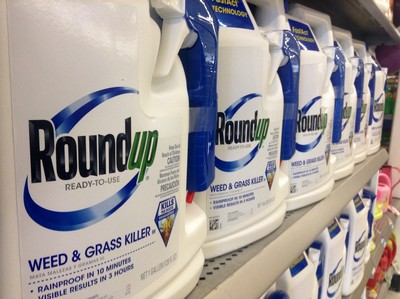California Denies Monsanto’s Request to Overturn Cancer Warning on Roundup Weed Killer
Get the updated whole story on Glyphosate. Key research not disclosed in study.
Monsanto’s popular glyphosate-based weed killer, Roundup, may cause cancer—at least in California—where a federal judge denied the multinational seed and chemical corporation’s bid to overturn a 2015 state ruling to label it as a cancer risk.
Under the temporary ruling, Monsanto will be required to label Roundup in accordance the state’s cancer warning, best known as Prop 65, making it the first state to require the label warning on the best-selling herbicide.
Monsanto sued California is an effort to reverse the decision, pointing to what it says in an illegal move by California, having based its decision on warnings made by the French-based health organization, the International Agency for Research on Cancer, instead of on U.S. research.
The U.S. Environmental Protection Agency considers glyphosate safe when used correctly, with few limitations on its use, citing it as a “low toxicity” chemical. Monsanto says that the Prop 65 label requirements in California, the nation’s largest agricultural state, would have severe financial repercussions for the company.
“It will absolutely be used in ways that will harm Monsanto,” Monsanto attorney Trenton Norris told the Los Angeles Times.
Monsanto’s Roundup is the best-selling weed killer in the world; it’s used on 250 crops just in California. But it’s also a poster product for the anti-GMO movement, as major genetically modified crops including cotton, soy, corn, canola, alfalfa, and sugar beets, heavily rely on glyphosate. Those crop seeds, also made by Monsanto, often bear the name “Roundup Ready” as they’re designed to withstand excessive applications of the herbicide without causing harm to the plant.

But weeds targeted by glyphosate have begun to develop resistance to Roundup, forcing farmers to use more frequent and heavier doses of the chemical. Monsanto and other agrochemical companies have also begun pairing glyphosate with other, often more aggressive chemicals, such as dicamba or 2,4-D, in order to combat the resistant weeds, dubbed “superweeds.”
And research continues to bring into question the safety of human exposure to glyphosate—both via application exposure, and residual levels found in food and drinks. The International Agency for Research on Cancer made the assessment that glyphosate earned classification as a “probable” human carcinogen because of its link to numerous cases of cancer. The chemical is also considered an endocrine disruptor, which can lead to serious health issues including metabolic disorders, weight gain, type-2 diabetes, and other serious illnesses.
Fresno County Superior Court Judge Kristi Kapetan is expected to issue a formal decision on the case in the very near future. If the ruling is upheld, Monsanto would have one year to add the warning label to Roundup products sold in the state.
Source(s):
organicauthority.com
yahoo.com
nationofchange.org